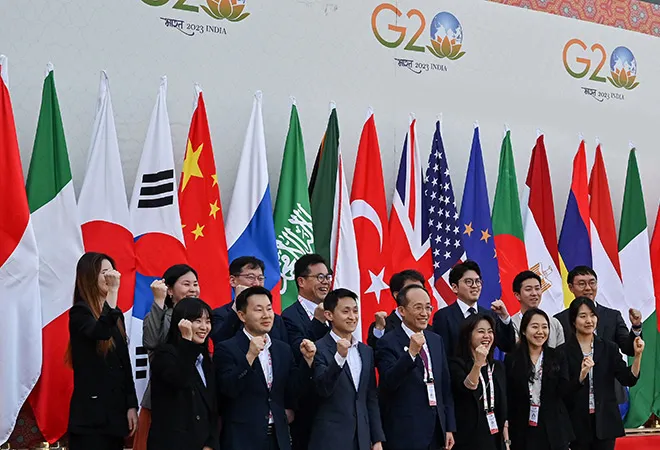
In the global rush towards the Indo-Pacific and the focus that is accorded to ‘major powers’, while referring briefly, policy debates and literature have often discounted the significance of Seoul. But as the United States and China enter increasingly murkier waters, South Korea will play an important part in Northeast Asia’s maritime geography. President Yoon Suk-Yeol’s key foreign policy thrust as soon as his administration came to office was to announce that South Korea will be transformed into a “
global pivotal state” and a "
new maritime power." Within less than a year, he has signalled this intent on political, diplomatic, economic, and infrastructural fronts and has initiated structural and operational changes aimed at stimulating the country’s maritime industry and expanding the scope of its maritime diplomacy.
With the launch of Seoul’s Indo-Pacific strategy, what is clear is its intention of engaging with and participating meaningfully in the region. For India, which is already regarded as a reliable and willing partner in the Indo-Pacific, this presents a strong opportunity to expand the horizons of bilateral engagement. New Delhi and Seoul are two key players in the Indo-Pacific in terms of their respective maritime geographies, geopolitical capabilities, and foreign policy orientations.
With the launch of Seoul’s Indo-Pacific strategy, what is clear is its intention of engaging with and participating meaningfully in the region.
After the previous government’s tenure that was focused to a greater degree on improving ties with North Korea (DPRK) to the inattention of foreign policy engagements with the neighbourhood as well as with the US, President Yoon’s approach is not only needed for course correcting Republic of Korea’s (ROK) domestic and foreign policy outreach but also for underscoring the country’s strategic advantages for Northeast Asia. It is also needed for amending the line adopted towards DPRK. President Yoon has even signalled his desire to mend ties and strengthen the security partnership with Japan.
Under Yoon’s stewardship, Seoul appears to be
moving swiftly to ensure that it continues to be a key security ally of the US in the region, that it is in step with the democratic and strategically likeminded countries of the Indo-Pacific, and that it leverages its strengths to best respond to regional concerns and demands. However, what must be remembered is that for countries like ROK and others in the Indo-Pacific, often, gradual yet measured steps are louder than vociferous pronouncements and action that the US can afford to carry out. This format is both a civilisational characteristic as well as a contemporary geopolitical necessity for regional countries.
Nonetheless, despite typical reticence, regional countries in the Indo-Pacific in the last five years have assumed
stronger and more articulate postures, particularly vis-à-vis Beijing, that has paved the way for greater intra-region collaboration.
Patterns of Convergence
While bilaterally the “special strategic partnership” between the two countries has been progressing at its own pace having found
convergence in New Delhi’s Act East (AEP) and Seoul’s New Southern Policy (NSP), the moment for forging deeper cooperation links in the context of the Indo-Pacific is now. Seoul’s Indo-Pacific strategy lists India as a key player as New Delhi is the best choice for Seoul’s outreach towards South Asia. If the NSP and the AEP were launchpads, both countries’ Indo-Pacific policies are the perfect meeting points for nurturing broader, more meaningful cooperation. As former President Moon
remarked during his visit in 2018, India and ROK are geared towards a “future-oriented cooperation with a 3P+ approach that goes beyond the New Southern Policy of Korea that focuses on people, prosperity and peace.” 2023, incidentally, will mark 50 years of bilateral diplomatic ties.
Seoul and New Delhi are both keen and, in a position to forge issue-based engagement with regional cooperation architectures such as the
ASEAN, Indian Ocean Rim Association, and the QUAD and perhaps, form informal as well as formal combinations of function-based and sector-specific minilateral cooperation. ROK has been keen to engage with the QUAD during the pandemic and will continue to be an active part of the QUAD Plus arrangement possibly leading to full membership. Whereas resilient supply chains, climate action, emerging and critical technologies, global health, sustainable infrastructure, and connectivity are the key areas of collaboration, in the context of the Indo-Pacific, all of these are underpinned by the development of maritime security cooperation.
Besides operational cooperation and capacity enhancement, other potential areas for boosting maritime cooperation include search and rescue, maritime domain awareness, marine pollution, humanitarian aid and disaster relief, anti-terrorism and anti-trafficking, prevention of marine pollution, and anti-piracy.
Yoon’s plan for transforming ROK’s maritime capacities include the establishment of a stable supply chain to support the country’s exports and imports backed by the requisite digital infrastructure, automated ports, and environment-friendly autonomous ships. These will be coupled with the
establishment of a stable distribution network by expanding the transportation capacities of South Korea-flagged vessels and securing overseas distribution bases, such as ports and distribution centres. For enabling his vision, the government will be investing substantially towards maritime economic and technological development. Agreements are already in place for cooperation in shipbuilding, often considered the Indian maritime sector’s missed opportunity, both for defence and commercial purposes, given ROK’s technological expertise in the domain. The modernisation of
naval shipbuilding projects, under Hindustan Shipyard Ltd. with the help of Korea Shipyard and sharing of
LNG shipbuilding technology by Korea’s STX Offshore and Shipbuilding Co. with GAIL India Ltd., are already underway. Besides operational cooperation and capacity enhancement, other potential areas for boosting maritime cooperation
include search and rescue, maritime domain awareness, marine pollution, humanitarian aid and disaster relief, anti-terrorism and anti-trafficking, prevention of marine pollution, and anti-piracy.
G20, New Delhi, and ROK
Why does India’s G20 Presidency provide a fitting moment for this purpose? Because as the world turns towards the Indo-Pacific, it is also turning increasingly towards India as a key regional partner, more resolutely willing and certainly more able than before. For Seoul, finding regional partners beyond its immediate ambit of US, Japan, Russia, and China has become vital because of the uncertainties posed by US-China rivalry and bitter experiences of China’s
campaign of economic retaliation after Seoul’s agreed to allow the US Terminal High Altitude Area Defense missile defence system to be deployed in the country. In addition to its advances in digital economy and development, as a democratic, economically capable, and politically willing country, India is a natural choice for the ROK. At the first International Financial Architecture working group meeting of the G20 in January, the South Korean delegation emphasised that
India is not only hard power evidenced by economy scale and population but also soft power equipped.
The
absence of ROK’ Foreign Minister at the G20 Foreign Ministers Meet in Delhi on 1-2 March, due to being busy with ‘domestic affairs’, prompted commentators to identify a break in momentum and speculate about the level of importance accorded to the meeting and the complexities of Russia’s war in Ukraine. But these interpretations are transient because while complexities of global compulsions are pervasive, they are unlikely to dampen the regional cooperation demands in the Indo-Pacific. While diplomatic rhetoric needs to be measured and contextualised, it is genuine and concrete cooperation that will bring about tangible and meaningful differences. In that regard, if the groundwork for deeper ties was laid during the previous Moon administration, with Seoul
embracing the free and open Indo-Pacific construct, the scope for ROK-India middle power diplomacy appears to have been accelerated under Yoon.
The views expressed above belong to the author(s). ORF research and analyses now available on Telegram! Click here to access our curated content — blogs, longforms and interviews.



 In the global rush towards the Indo-Pacific and the focus that is accorded to ‘major powers’, while referring briefly, policy debates and literature have often discounted the significance of Seoul. But as the United States and China enter increasingly murkier waters, South Korea will play an important part in Northeast Asia’s maritime geography. President Yoon Suk-Yeol’s key foreign policy thrust as soon as his administration came to office was to announce that South Korea will be transformed into a “
In the global rush towards the Indo-Pacific and the focus that is accorded to ‘major powers’, while referring briefly, policy debates and literature have often discounted the significance of Seoul. But as the United States and China enter increasingly murkier waters, South Korea will play an important part in Northeast Asia’s maritime geography. President Yoon Suk-Yeol’s key foreign policy thrust as soon as his administration came to office was to announce that South Korea will be transformed into a “ PREV
PREV


